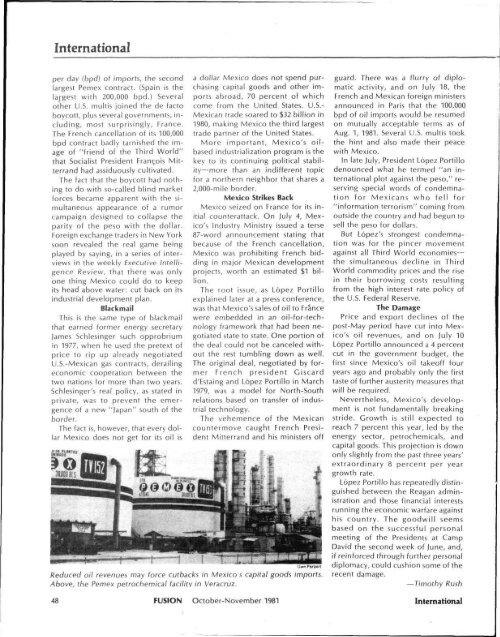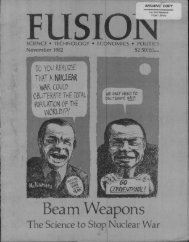Riemann's Contribution to Flight and Laser Fusion
Riemann's Contribution to Flight and Laser Fusion
Riemann's Contribution to Flight and Laser Fusion
- No tags were found...
Create successful ePaper yourself
Turn your PDF publications into a flip-book with our unique Google optimized e-Paper software.
Internationalper day (bpd) of imports, the secondlargest Pemex contract. (Spain is thelargest with 200,000 bpd.) Severalother U.S. multis joined the de fac<strong>to</strong>boycott, plus several governments, including,most surprisingly, France.The French cancellation of its 100,000bpd contract badly tarnished the imageof "friend of the Third World"that Socialist President Francois Mitterr<strong>and</strong>had assiduously cultivated.The fact that the boycott had nothing<strong>to</strong> do with so-called blind marketforces became apparent with the simultaneousappearance of a rumorcampaign designed <strong>to</strong> collapse theparity of the peso with the dollar.Foreign exchange traders in New Yorksoon revealed the real game beingplayed by saying, in a series of interviewsin the weekly Executive IntelligenceReview, that there was onlyone thing Mexico could do <strong>to</strong> keepits head above water: cut back on itsindustrial development plan.BlackmailThis is the same type of blackmailthat earned former energy secretaryJames Schlesinger such opprobriumin 1977, when he used the pretext ofprice <strong>to</strong> rip up already negotiatedU.S.-Mexican gas contracts, derailingeconomic cooperation between thetwo nations for more than two years.Schlesinger's real policy, as stated inprivate, was <strong>to</strong> prevent the emergenceof a new "Japan" south of theborder.The fact is, however, that every dollarMexico does not get for its oil isa dollar Mexico does not spend purchasingcapital goods <strong>and</strong> other importsabroad, 70 percent of whichcome from the United States. U.S.Mexican trade soared <strong>to</strong> $32 billion in1980, making Mexico the third largesttrade partner of the United States.More important, Mexico's oilbasedindustrialization program is thekey <strong>to</strong> its continuing political stability—morethan an indifferent <strong>to</strong>picfor a northern neighbor that shares a2,000-mile border.Mexico Strikes BackMexico seized on France for its initialcounterattack. On July 4, Mexico'sIndustry Ministry issued a terse87-word announcement stating thatbecause of the French cancellation,Mexico was prohibiting French biddingin major Mexican developmentprojects, worth an estimated $1 billion.The root issue, as Lopez Portilloexplained later at a press conference,was that Mexico's sales of oil <strong>to</strong> Francewere embedded in an oil-for-technologyframework that had been negotiatedstate <strong>to</strong> state. One portion ofthe deal could not be canceled withoutthe rest tumbling down as well.The original deal, negotiated by formerFrench president Giscardd'Estaing <strong>and</strong> Lopez Portillo in March1979, was a model for North-Southrelations based on transfer of industrialtechnology.The vehemence of the Mexicancountermove caught French PresidentMitterr<strong>and</strong> <strong>and</strong> his ministers offReduced oil revenues may force cutbacks in Mexico's capital goods imports.Above, the Pemex petrochemical facility in Veracruz.guard. There was a flurry of diplomaticactivity, <strong>and</strong> on July 18, theFrench <strong>and</strong> Mexican foreign ministersannounced in Paris that the 100,000bpd of oil imports would be resumedon mutually acceptable terms as ofAug. 1, 1981. Several U.S. multis <strong>to</strong>okthe hint <strong>and</strong> also made their peacewith Mexico.In late July, President Lopez Portillodenounced what he termed "an internationalplot against the peso," reservingspecial words of condemnationfor Mexicans who fell for"information terrorism" coming fromoutside the country <strong>and</strong> had begun <strong>to</strong>sell the peso for dollars.But Lopez's strongest condemnationwas for the pincer movementagainst all Third World economies—the simultaneous decline in ThirdWorld commodity prices <strong>and</strong> the risein their borrowing costs resultingfrom the high interest rate policy ofthe U.S. Federal Reserve.The DamagePrice <strong>and</strong> export declines of thepost-May period have cut in<strong>to</strong> Mexico'soil revenues, <strong>and</strong> on July 10Lopez Portillo announced a 4 percentcut in the government budget, thefirst since Mexico's oil takeoff fouryears ago <strong>and</strong> probably only the firsttaste of further austerity measures thatwill be required.Nevertheless, Mexico's developmentis not fundamentally breakingstride. Growth is still expected <strong>to</strong>reach 7 percent this year, led by theenergy sec<strong>to</strong>r, petrochemicals, <strong>and</strong>capital goods. This projection is downonly slightly from the past three years'extraordinary 8 percent per yeargrowth rate.Lopez Portillo has repeatedly distinguishedbetween the Reagan administration<strong>and</strong> those financial interestsrunning the economic warfare againsthis country. The goodwill seemsbased on the successful personalmeeting of the Presidents at CampDavid the second week of June, <strong>and</strong>,if reinforced through further personaldiplomacy, could cushion some of therecent damage.—TimothyRush48 FUSION Oc<strong>to</strong>ber-November 1981 International
















